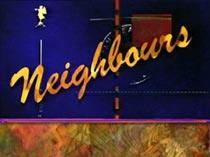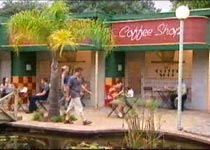|
.
Interviews
>
Dave Worthington
In
1992, a host of new names joined the Neighbours production
team, and one of those names was veteran writer Dave Worthington.
Having previously scripted for the series in the 1980s, Dave
returned to Ramsay Street as co-producer and oversaw a period
on the show which saw various changes to format, style and
content. He spoke to us about his Neighbours experience
and explained the reasons for the changes he made...
Can
you give us a background on your career before Neighbours?
I started writing for theatre restaurant in Brisbane in the
mid 70s, then moved to Melbourne in 1979 to work on Prisoner
- Cell Block H. Four years later, I went to Sydney to
work in drama development for a couple of years, then went
freelance. It was then that I started writing for Neighbours.
Your
first involvement with Neighbours was as a scriptwriter
in the 1980s at the height of the show's success. What are
your memories of that time?
In those days, the Neighbours script department was
in Grundy's Sydney office, while the show was of course made
in Melbourne. This was unusual, but had come about because
prior to selling Neighbours, Grundy's had had a show
based in Sydney which had been axed (I think it was the cop
show called Waterloo Station). They had a script team
with nothing to do, so they moved them on to working on Neighbours.
As a freelancer, you were pretty well detached from the show,
and my vague memories were simply of going into the office
and collecting the storylines, then delivering my script a
week or so later. My only contacts were the script editors
- at that time Rick Maier and Ysabelle Dean.
You
became more centrally involved with the series in 1992 when
you became the co-producer - how did that job come about?
I'd been employed by Grundy's then Head of Drama Ian Bradley
to work in drama development, when a bit of a crisis occurred.
Ratings had been slipping and the Network executives were
panicking and demanding changes be made! It was a fairly routine
occurrence - still is! So I was brought in to effect a few
changes - and probably didn't make any friends along the way,
but that's show biz!
What
did your job entail?
Basically, I oversaw the running of the script department
and had overall responsibility for the scripts. However, although
I was involved in the general story planning for the week,
and had to make some general changes to story direction and
"feel", I wasn't involved in the detailed plotting
of episodes and didn't interfere too much with the scripting
process. I was based in Sydney and the delightful Margaret
Slarke was the hands-on producer who handled the day-to-day
running of the show in Melbourne. Although I had co-producer
credit, she remained at the helm.

Were
there any areas you wanted to change about the show when you
joined?
Any serial - especially one being made at five episodes per
week for a number of years - inevitably goes through less-than-fresh
periods, and the people involved in creating it need a break
to rejuvenate the brain cells. My first recommendation was
to change the script department, as they had all been on the
show for a number of years and needed time out. Luckily at
the time, Grundy's was expanding world-wide, and a lot of
opportunities were opening up overseas, so we were able to
relocate people. As we were changing most of the script department
anyway, it seemed to make sense to get Melbourne writers and
relocate the whole department closer to production. At the
time, we were getting an enormous amount of script amendments
to process each week, and I figured a closer liaison between
the script department and production would be beneficial.
In one of the interviews I read on your site, someone mentioned
a "dark period" of storylines, which is probably
the one I was responsible for! It was generally felt at the
time that the serial had got so sugary sweet, that it had
lost its "reality", so we deliberately beefed up
the storylines a bit; turned things on their heads; shook
things up to get people talking about the show and hopefully
watching again. I should point out that it was in Australia
that the ratings were slipping - I don't think the popularity
was too adversely affected in UK at the time, (but maybe it
was after some of the stronger storylines went through ...!
It was a slow process: towards the end of my run on the show
we had lifted the ratings a couple of points, but not enough
for the Network. And the irony was, by now, the Network head
of drama had changed and the edict was that they wanted Neighbours
to go back to the way it was! This was good for Grundy's,
as they were getting complaints from the BBC that the storylines
were far too bleak, so everything had to settle down again.
By that stage the script department was firmly established
in Melbourne, and I'd gone back to Drama Development.
What
characters did you most enjoy creating storylines for, and
why?
One
of the first stories I suggested was for Doug and Pam Willis
- Doug's "Fatal Attraction" affair with Jill Weir.
This was an example of what I mean by turning things on their
head. Doug and Pam were Ramsay Street's stable, reliable,
old married couple and most of their stories revolved around
them being the foils for the teenagers; Brad and Beth and
Gaby. There was a lot of opposition to this story at the time,
with most of the old guard claiming the characters "wouldn't
do this ..." My point was and still is, that in real
life people will do anything with the correct motivation,
and I think we told the story well enough that the audience
understood and empathised with both Pam and Doug - even if
they didn't approve. We ended up with them in a stronger position
as characters, because the flaw in their marital utopia made
them more real.
Do
you have any favourite storylines from your time with the
show?
One
which springs to mind concerned Phoebe's boyfriend Stephen
Gottlieb, played by Lochie Daddo.
Again, it was a case of making a super-nice character a little
more real by giving him some flaw; in this case a head injury
which caused a radical change in his personality. I was mortified
when I bumped into Lochie at the studio one day and he told
me that the storyline closely paralleled a situation in his
own family. I had no idea we had created a story so close
to his real life situation, and apologised profusely for the
mistake, but Lochie was marvellous about it, claiming he'd
drawn on his own experiences to play the part. A basic premise
of method acting! I think Lochie did a terrific job - his
performance and his character became far more believable after
that.
During
your time on the show, a number of long standing characters
departed, including Jim, Todd, Madge and Dorothy. How did
you cope with these prolific departures, and do you think
their exits effected the show?
When I first started in television, Carol Burns (who played
Frankie Doyle) was about to leave Prisoner, and everyone
was convinced the show's popularity would wane, but production
went on for another eight years or so, and it's unbelievably
still popular today! On any long-running show, there's always
apprehension when major characters leave. Are the ratings
going to drop? Is this person the one reason people tune in
to watch every night? The answer is invariably No. It wasn't
my decision to write out any of the characters you mention;
Todd's death in fact had already been shot before I joined
the show - (and what an incredibly powerful scene it was,
too! But some characters needed to be culled because there
were two many "unattached" characters in the show
- they didn't have any direct relationships and the family
situations they were in were tenuous and contrived at least.
We needed to introduce a new nuclear family to the Street
and unfortunately the cast budget didn't stretch. I don't
think their exits affected the show at all - people kept watching
to see who their replacements would be, and what their stories
were.
Do
you recall anything about the Lim family, who were introduced
during your time on the show in an attempt to tackle the issue
of racism in Erinsborough?
I remember we brought the Asian family in mainly because it
was something that hadn't been done before. There's a lot
of covert racism in Australian suburbia, and it seemed a valid
story to do.
What
did you most enjoy about working on Neighbours?
The people. The crew I came into contact with were a wonderful
bunch of people, and in an industry as insecure as this, it's
good to see them regularly employed for so long. I get very
annoyed when I hear criticism of soap opera. The rigours of
producing five half-hours a week - particularly in Melbourne's
inclement climate -takes its toll, but every week, those guys
churn out the equivalent of one and a half movies. The wonder
is that it gets made at all.
What
have you worked on since leaving Neighbours?
After Neighbours, I stayed on at Grundy's in drama
development for a couple of years until they were bought out
by Pearsons. Drama development was moved off-shore and as
I didn't particularly want to leave Australia to work overseas,
I decided to go freelance again. I've worked as scriptwriter
and editor on Home and Away and Blue Heelers
and done development work on children 's animation projects.
Do
you ever watch the show now? If so, what do you think of it?
No, I don't watch now. I prefer gritty police dramas these
days! But it's refreshing to read Ric Pellizzeri's thoughts
on the show. I've known Ric for years - from working on
A Country Practice and Blue Heelers - and clearly
he has a vision for the show which will rejuvenate it for
the next eighteen years!
What
would you say are the strengths and weaknesses of the Neighbours
format?
The strength of any show is its characters, and it's to the
credit of the actors involved that they can bring the characters
to life so well that following their day-to-day lives becomes
addictive to audiences. Obviously the stories (read scripts)
play a large part, but in the sausage-machine of production,
it's impossible to churn out award-winning drama five nights
a week for forty-something weeks a year. Inevitably there
will be a proportion of stories that are not as riveting as
others, and the serial relies on the familiarity of the characters
to hold the audience.

What
do you think has made Neighbours so successful?
The fans. Particularly in England. It always amazes - and
gratifies - me that people in the UK give such continuing
support to TV shows and their stars. Here in Australia there
is great hysteria from fans while stars are on air, but once
they leave the show - or the show is dropped - then it seems
they're quickly forgotten. Keep it up you Pommie guys!!
Interview by Moe. Added on 13th August 2003
Back
|

